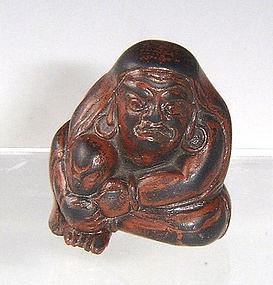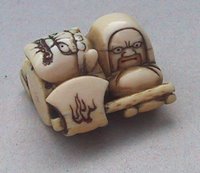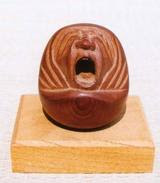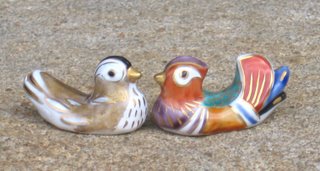. zooge 象牙 ivory art in Japan .
:::::::::::::::::::::::::::::::::::::::::::::::::::::::::::::::::::::::::::::::::::::::::::::::::::::
Netsuke 根付
are miniature sculptures that were invented in 17th-century Japan to serve a practical function (the two Japanese characters ne+tsuke mean "root" and "to attach").
Traditional Japanese garments—robes called kosode and kimono—had no pockets; however, men who wore them needed a place to store their personal belongings, such as pipes, tobacco, money, seals, or medicines.
© More in the WIKIPEDIA !
:::::::::::::::::::::::::::::::::::::::::::::::::::::::::::::::::::::::::::::::::::::::::::::::::::::

- shared by Walter on facebook -
:::::::::::::::::::::::::::::::::::::::::::::::::::::::::::::::::::::::::::::::::::::::::::::::::::::
THE COHEN COLLECTION
Netsuke, inro, ojime, lacquer works of art, snuff bottles, pendants jade and ivory carvings

All fully described by
Neil K. Davey & Robert Hall
source : www.jncohen.net
:::::::::::::::::::::::::::::::::::::::::::::::::::::::::::::::::::::::::::::::::::::::::::::::::::::::

- shared by Mark Harris, FB
:::::::::::::::::::::::::::::::::::::::::::::::::::::::::::::::::::::::::::::::::::::::::::::::::::::::
Many netsuke with Daruma introduced here are from extensive internet search of Ebay, Trocadero and other soucres.
http://www.trocadero.com/cgi-bin/search1.cgi
Since they usually disappear soon from the web, I have prepared a safecopy in my photoalbum.
gabigreve/ photoalbum
I wish to express my thanks to the many dealers who show their Daruma netsuke online. If this little collection would help to promote the sales, I will be happy ! And if you want to share them here directly too, please go ahead.
To read more about Netsuke, check the following LINKS:
The International Netsuke Society
http://www.netsuke.org/
Sagemono-ya in Tokyo
http://www.netsuke.com/main.htm

Boy carrying Daruma in Furoshiki
:::::::::::::::::::::::::::::::::::::::::::::::::::::::::::::::::::::::::::::::::::::::::::::::::::::::::::::::::::::::::::

source : facebook
György Ráth Museum - Budapest
:::::::::::::::::::::::::::::::::::::::::::::::::::::::::::::::::::::::::::::::::::::::::::::::::::::
The order the netsuke are listed below is arbitrary.
Click on the links to see the pictures please.
:::::::::::::::::::::::::::::::::::::::::::::::::::::::::::::::::::::::::::::::::::::::::::::::::::::
Dmitry Levit Asian Art
Boy with Daruma and Cloth
19 century ivory netsuke of a Chinese boy pulling a wrapping textile over a cloth doll of Zen Buddhism patriarch Daruma. Excellent faces, fantastic quality etching of facial hair of the doll, beautiful wear and patina. Himotoshi (cord opening) is located under the left arm of the boy. Height 1 1/8 inches
photos.gabigreve#56
Boy and Daruma Snowman by Masahiro
19 century ivory netsuke of a boy making a snowman in a form of theZen Buddhism patriarch Daruma, with his handprints all over thesnowman. Excellent carving, especially facial expressions - delightedof the boy, and ferocious of Daruma, very nice patina. The hair knots of the boy and the eyes of Daruma are inlaid with dark horn. Nice etched pattern on textiles, usual age lines. Wonderful sculpture -all that a good netsuke should be. Signed MASAHIRO on the bottom. Masahiro Gyokkosai of Osaka school worked in mid-19th century, was one of the foremost students of Mitsuhiro and carved much in the style of his master - see NETSUKE & INRO ARTISTS AND HOW TO READTHEIR SIGNATURES by George Lazarnick, p.704. Length 1 3/4 inches.1250 Dollars.
photos.gabigreve
Daruma and Demon by Gyoku-Unsai
Late 19th century ivory netsuke carved as Daruma (Boddhidharma - thefounder of Zen Buddhism) wearing an earring and enveloped in hismonastic robe with cape, sitting trying to read a book, while beingdistracted by oni (little mischievous demon) standing by his side with a club in its hand. Fantastic carving of the face with the expression of extreme annoyance, great rendition of hair in his beard and on his chest. Very nice patina, old age lines in ivory, old restoration (about a third of the front page of the book, very welldone). Signed GYOKUUNSAI on the bottom - the artist is listed on p.432 of NETSUKE & INRO ARTISTS AND HOW TO READ THEIR SIGNATURES byGeorge Lazarnick.
Height 1 1/8 inches.
photos.gabigreveNr. 20
Manju-Type Daruma by Gyokkei
19th century ivory netsuke in manju (rice cake) shape carved insunken relief with Daruma (Boddhidharma - the founder of ZenBuddhism) wearing earrings and enveloped in his monastic robe blownby the wind. The back is decorated with incised hossu - flywisk.Fantastic carving of his face with the expression of extremeconcentration, great rendition of hair in his beard and on his chest.Himotoshi in the center of the back is lined with ivory inset stained green. Two parts fit nicely, honey colored patina on the back where netsuke was touching the silk of kimono. Signed GYOKKEI on the back.For information on the artist see NETSUKE & INRO ARTISTS AND HOW TOREAD THEIR SIGNATURES by George Lazarnick, p. 417. Wonderful work ofart by the master carver.
Diameter 1 5/8 inches.
photos.gabigreveNr. 12
Wooden okimono size netsuke 19th cent.
okimono representing standing Daruma (founder of Zen Buddhism) enveloped in his monastic robe. Wonderful face with almost portrait features, graceful flow to his robe. Himotoshi might have been added, old smoothed and stained loss at the bottom of the robe on the back .
Height 4 11/16 inches.
photos.gabigreve
Akubi no Daruma, Daruma yawning
19th century ivory netsuke carved as a cloth toy in a form of Zen Patriarch Daruma stretching and yawning after 9 years of meditation. Excellent carving, fantastic facial expression, great rendition of the patched body of the doll with various textile patterns. Beautiful staining and patina from wear, old age line. Signed GYOKUSAI in an oval reserve on the side - the carver is probably one of the 3 artists who signed this way (see Neil Davey NETSUKE, p. 461).
Height 1 7/8 inches.
photos.gabigreve
.. .. .. Ojime
Numerous Daruma. Ivory19th century ivory ojime (slide bead for tightening the cord goingfrom netsuke to inro) carved in the round with numerous dolls representing Daruma (the founder of Zen Buddhism). Excellent clevercarving, central hole is lined with silver, wonderful warm patina andbeautiful sheen to the surface, in very good condition. Height 13/16inches.
photos.gabigreve2000/

19c okimono DARUMA by netsuke carver SUKEYUKI
Late Meiji period (1890s -1912) wooden okimono of cloth doll of Daruma (founder of Zen Buddhism) enveloped in his monastic robe.
Skillfully carved out of chosen matsu (Korean pine wood) in ittobori (one cut) style characteristic of Hida school of netsuke carvers with clever use of wood grain as element of design.
source : trocadero.com/stores/dmitry/items
.......................................................................
AVERY ART & ANTIQUES
Pop-out eyes, IvoryDaruma,
the Indian priest who so worshipped the Buddha that he cutoff his eyelids to prevent them from closing while he prayedendlessly, so long indeed that his legs shriveled beneath him. Thisexquisite little ivory netsuke portrays him as a rolypoly figurewhose eyes pop out when the figure is moved. Japanese, early Twentieth Century, and signed by the artist, it is approximately 1-1/4 inches high by 7/8 of an inch in diameter.
http://www.trocadero.com/averyart/items/162612/item162612.html
photos.gabigreve2000/
xxxxxxxxxxxxxxxxxxxxxxxxxxxxxxxxxxxxxxxx
Chilong Antiques
Daruma enduring Moxa, Bizen

A Bizen stoneware netsuke showing Daruma enduring moxa. Height: 1 ½in. 19th century.The identical figure in the renowned Raymond and Frances Bushell sale(Part 1, 27 October 1987, lot 274) realised £ 550. Bushell’s example is illustrated in Arts of Asia 3/4 1976, fig. 12.
photos.gabigreve2000/
Boy holding Daruma. Boxwood.
A good quality boxwood and marine ivory okimono of a child with an outsized Daruma doll. Height: 1 5/8 in. Unsigned. Meiji. Late nineteenth century.
photos.gabigreve2000/
xxxxxxxxxxxxxxxxxxxxxxxxxxxxxxxxxxxxxxxx
source : Moró Antik
Daruma trimming his nosehair...
xxxxxxxxxxxxxxxxxxxxxxxxxxxxxxxxxxxxxxxx
Asiantiques
Simply Seated. Wood.
Late 19th Century Of Daruma seated in a meditating position and wrapped in his coat.The pupils are inlaid in dark horn and the details very well carved.The wood used is probably a fruit wood, possibly from the cherry or persimmon tree.
1.1/2in. (3.8cm.) high
photos.gabigreve2000/
:::::::::::::::::::::::::::::::::::::::::::::::::::::::::::::::::::::::::::::::::::::::::::::::::::::
Alexander Fine Art
Ivory Netsuke of Daruma
Carved seated and holding a wisk. Date: Meiji period, 19th century.
Size: 1 1/2 in. high.
photos.gabigreve2000/
:::::::::::::::::::::::::::::::::::::::::::::::::::::::::::::::::::::::::::::::::::::::::::::::::::::

Netsuke of Daruma as Hyotoko

Benkei and Kamewakamaru as Daruma
Look at more interesting netsuke from Sagemonoya :
source : www.netsuke.com/netsuke
:::::::::::::::::::::::::::::::::::::::::::::::::::::::::::::::::::::::::::::::::::::::::::::::::::::::::::::::::::::::::::
Oriental Arts
http://www.littletonandhennessy.com/
Chasing a Rat. Katabori
A rare and superb katabori netsuke in wood of DARUMA, 18TH century
Seated, holding a hos-su, trying to chase away a rat climbing on his back and bitting him. The wood bears an incredible rich and deep patina. The eyes of Daruma with a double incrustation, ivory and wood. The wood rater worn and in very good condition, a fantastic expression. The rat is not the only "thing" sended to disturb Daruma, just look at the bottom of the piece; there are two simulated mask of demons. A real masterpiece! Unsigned, 18th century, Tokyo circa 1780
H: 2.6cm L:3.6cm
photos.gabigreve2000/
Onna Daruma. Ivory.
A very nice manju of octogonal form representing Onna Daruma, the ivory bearing a good patina, signed in cursiv at the back of the piece.
L: 5.5cm
photos.gabigreve/
xxxxxxxxxxxxxxxxxxxxxxxxxxxxxxxxxxxx
B & C Antiques
Boy playing with Daruma Doll. Polychrome. Komin.
A polychrome ivory netsuke of a young boy kneeling down to play with a tiny Daruma doll. Carved and signed by Japanese artist Komin, 20th century. When Westerners began to take an interest in netsuke, particularly in the late 19th and early 20th centuries, netsuke carvers turned to the world around them for netsuke subjects.
Activities of ordinary people, such as this child at play, helped create a picture of Japan during the period in which the pieces were carved.
Daruma, the monk who brought Zen Buddhism to Japan, has become a familiar and beloved figure with an important place in religion, art and folk culture. His most frequent representation is of a roly-poly figure without limbs. This roly-poly figure makes one of the most popular toys in Japan. A symbol of patience and perseverance, it rights itself when knocked over. Condition is excellent with wonderful patina.
Overall dimensions: 1 ½” x 7/8” x 1” high.
photos./gabigreve
xxxxxxxxxxxxxxxxxxxxxxxxxxxxxxxxxxxxxxxx
Hans-Martin Schmitz
Alte Kunst aus China und Japan
http://www.asianartschmitz.de/deutsch/netsuke.html
Daruma with toys, demons and fox mask

Spielzeuge, u.a. Darumapuppe, Oni- und Fuchsmaske,Elfenbein,
L. 3,2 cm1. Häfte 19. Jh.
photos.gabigreve # 18/
Boy with Snowman Daruma, Ivory
Schneeball-Daruma Elfenbein, H. 2,7 cmSign.: Masahiro Ôsaka, 19. Jh.
photos.gabigreve2000/

:::::::::::::::::::::::::::::::::::::::::::::::::::::::::::::::::::::::::::::::::::::::::::::::::::
La Galliavola / Arte Orientale

Height mm 78, lenght mm 53
source : www.lagalliavola.com
:::::::::::::::::::::::::::::::::::::::::::::::::::::::::::::::::::::::::::::::::::::::::::::::::::
Daruma Doll.
Boxwood with mammoth ivory and bamboo inlays
Height: 1 1/4" / Signed: Zanmai

source : www.takaraasianart.com
:::::::::::::::::::::::::::::::::::::::::::::::::::::::::::::::::::::::::::::::::::::::::::::::::::
Kunstwerke aus Mammut Elfenbein
http://www.mammut.claranet.de/F1001.htm
Four Daruma huddeling. mammoth ivory
Vierfacher Daruma

photos.gabigreve2000/
xxxxxxxxxxxxxxxxxxxxxxxxxxxxxxxxxxxxxx
Some Daruma come in form of Shunga, erotic scenes 春画
Gallerie Flachsmann
http://www.galerie-flachsmann.de/
Okame in der Form von Daruma (Shunga)
O-Kame san
signiert Masahiro Osaka Schule
Elfenbein IVORY 3,6 cm
photos.gabigreve
xxxxxxxxxxxxxxxxxxxxxxxxxxxxxxxxxxxx
Seated Daruma, 13 cm high
Looks very unauspicious, until you turn him upside down.
photos.gabigreve
Onna Daruma, Lady Daruma with the special touch
photos.gabigreve/
I have written about her in the story about
Daruma and the Courtesans.
http://darumasan.blogspot.com/2005/01/daruma-and-courtesans.html
:::::::::::::::::::::::::::::::::::::::::::::::::::::::::::::::::::::::::::::::::::::::::::::::::::::
Mice and Daruma
Masanobu

Gallery Zacke, Vienna
1010 Vienna, Kohlmarkt 7 Stairway 3/1, 1st Floor
source : www.zacke.at
:::::::::::::::::::::::::::::::::::::::::::::::::::::::::::::::::::::::::::::::::::::::::::::::::::::
Diameter about 45 mm. It has two small holes in the tsumami.
It was most probably made from ivory in the Edo period.

Back side

Photo from my friend Ishino.
xxxxxxxxxxxxxxxxxxxxxxxxxxxxxxxxxxxxxxxx
.. .. .. .. .. More about my Netsuke Collection
See my Netsuke Album.
They are not all in my position, this is a virtual collection.
gabigreve / photoalbum
.. .. .. .. .. .. .. .. Some articles
Bosshard about Netsuke, an article
http://groups.yahoo.com/group/Darumasan-Japan/message/458
:::::::::::::::::::::::::::::::::::::::::::::::::::::::::::::::::::::::::::::::::::::::::::::::::::::
More thumbnail netsuke photos !



Click on the thumbnail to view more !

:::::::::::::::::::::::::::::::::::::::::::::::::::::::::::::::::::::::::::::::::::::::::::::::::::::
..... Latest Aquisitions
Netsuke, man with daruma, badly carved
Netsuke wood large.
Netsuke, Arms over head
Ojime red laquer おじめ
Netsuke from Celadon
Netsuke from Ivory, Inemuri Daruma 居眠りだるま
blog.livedoor.jp/gabigreve2000/
:::::::::::::::::::::::::::::::::::::::::::::::::::::::::::::::::::::::::::::::::::::::::::::::::::::
Wooden Onna Daruma

Photo from my friend Ishino.
:::::::::::::::::::::::::::::::::::::::::::::::::::::::::::::::::::::::::::::::::::::::::::::::::::::

Photo from my friend Ishino.
about 3.9 cm high and 30 g heavy.
:::::::::::::::::::::::::::::::::::::::::::::::::::::::::::::::::::::::::::::::::::::::::::::::::::::::::::::::::::::::::::
. inroo, inrō 印籠 / 印篭 / いんろう Inro, pillbox, pill box .
- Introduction -

source : tukubaskecth.tsukuba.ch
The famous inro of Mito Komon occupied by manekineko !
- quote
An inrō (印籠) is a traditional Japanese case for holding small objects, suspended from the obi.
- - - More in the WIKIPEDIA !
. Cats and Daruma 招き猫とだるま Manekineko .
:::::::::::::::::::::::::::::::::::::::::::::::::::::::::::::::::::::::::::::::::::::::::::::::::::::::::::::::::::::::::::
.....- My Netsuke Photo Gallery -
. Netsuke omamori 根付お守り netsuke amulets .
:::::::::::::::::::::::::::::::::::::::::::::::::::::::::::::::::::::::::::::::::::::::::::::::::::::
Shunga Daruma 春画だるま
:::::::::::::::::::::::::::::::::::::::::::::::::::::::::::::::::::::::::::::::::::::::::::::::::::::
snuff bottle, snuffbottle スナッフボトル


Made in Japan for the Chinese market, Meiji Period (1868-1912)
Of diamond shape carved in low relief with Daruma holding a hossu in his arms on side,
and 半諾迦尊者 Handaka Sonja carrying his bowl on the other,
the base with a shou character.
H: 2 1/8in. (5.5cm.)
source : Asiantiques - New Orleans, LA
- quote
By most terms of history in China, snuff bottles are a relatively
recent development. Tobacco reached China toward the end of the 16th
Century. Similar in time to itsf introduction into England. When
tobacco was converted into snuff is hard to say but by the mid
seventeenth century seems to be likely. Customs records document that
by 1685 snuff was entering China although it possibly may have been
in use prior to that date. Snuff, however, did not come into common
usage and was largely a habit of the upper classes. The Jesuits
introduced its use at court and soon it became increasingly common
among the court, rich landlords and merchants.
The Chinese believed that snuff possessed medicinal qualities and
that its use helped to dispel colds, cure migraine, sinus and tooth
pain, relieve throat trouble, cause sweats and counter asthma and
constipation. Snuff was believed to be particularly an aid to
digestion. Beijing was always the center of snuff usage in China.
The gHsiang tsu pi chih, a document written in the early 18th
Century, notes that snuff was being manufactured in Beijing at this
time. Mint, camphor and Jasmine were and still are added to snuff in
China.
It was not until the eighteenth century that snuff-bottles began to
be made in large numbers. The traditional shape for snuff bottles
were that they were small enough to fit in the palm of the hand.
Generally they were provided with a small spoon fixed in the stopper
and capped usually with a hemispherical piece of jade. This later
touch is undoubtedly a creation of the Chifen Lung period. Snuff
bottles are most probably an evolution of the small medicine bottles
that are common from an earlier period and the earliest dated piece
is 1653. Snuff bottles often have either the makerfs name or the
date but rarely both are present together. A large number of Chinese
snuff bottles carry the mark of Chfien Lung, but most of these were
really made during the reign of Tao Kuang (1821-1850) or later.
Further, most of the snuff bottles with the Kfang Hsi reign mark
were made significantly later. All of the bottles with interior
painting date much later and were made into the early years of the
nineteenth century.
Snuff bottles are made of a wide variety of materials. These include
coral, ivory, jade, jadeite, mother of pearl, lapis lazuli, quartz,
malachite, agate, turquoise as well as gold, silver and many more
exotic materials. Despite the number of exotic materials to chose
from, glass remained the most popular substance to use and most
surviving models are from this material. Glass was treated much
differently by the Chinese during this period than it is today. The
Chinese cut and polished it like a precious stone. By mixing metal
oxides, the subsequent glass could be turned into exquisite glass
sculptures. The glass for these works generally originated in
Shantung although the cutting itself was done in Beijing.
- source : www.asia-art.net
. . . CLICK here for more Photos of Handaka Sonja!
:::::::::::::::::::::::::::::::::::::::::::::::::::::::::::::::::::::::::::::::::::::::::::::::::::::
. Daruma dancing with both legs 足 ashi .

source : galina on fb - 2015
And now Daruma is sneaking out on tip-toe . .
:::::::::::::::::::::::::::::::::::::::::::::::::::::::::::::::::::::::::::::::::::::::::::::::::::::
. zooge 象牙 ivory art in Japan .
[ . BACK to DARUMA MUSEUM TOP . ]
[ . BACK to WORLDKIGO . TOP . ]
- #netsuke #darumanetsuke -
:::::::::::::::::::::::::::::::::::::::::::::::::::::::::::::::::::::::::::::::::::::::::::::::::::::











8 comments:
wow, thanks for the very thorough and comprehensive list. an all-around excellent resource! if i could just recommend a great online resource for antique/modern netsuke auctions?-- antiquespider. good luck and happy netsuke shopping!
-ab
Yosa Buson
ころもがへ印籠買ひに所化(しょげ)二人
koromogae inroo kai ni shoge futari
koromogae inroo kai ni shoke futari
For the new wardrobe
To buy a seal-case
Two monks have come!
Tr.Thomas McAuley
A book on netsuke
The British Museum’s Noriko Tsuchiya compiles an intricate selection of netsuke, a prized Edo Period (1603-1867) art form of miniature sculptures.
Her book contains 100 photographs, paired with color illustrations to contrast composition and artistic expression.
- Japan Times, September 21, 2014
.
Netsuke of Kappa Leading a Blind Man
minogame 蓑亀 minokame,
"turtle with a raincoat"
art motives
catalogue with netsuke starting at page 5
Nr. 215
.
215
NETSUKE. KIRIN. IVORY.
First half of 19th century.
until Nr.
363
NETSUKE. LARGE RAT, ITS LONG TAIL WRAPPED AROUND THE BODY.
,
Take your time to browse !
http://katalog.van-ham.com/en/page/5/
.
The Ghosts, Mermaids, and Beautiful Rats of Japan’s Tiny Netsuke Carvings
by Allison Meier
Miniature meditating skeletons, snarling cats, eerie ghosts, and gods of fortune carved in ivory, wood, and horn adorned the sashes of Japanese men throughout the Edo period. From the 17th to 19th century, these netsuke carvings evolved as an increasingly elaborate art, eventually collected around the world. The British Museum in London has over 2,300 examples in its collection, 100 of which were newly photographed for Netsuke: 100 Miniature Masterpieces from Japan by Japanese art curator Noriko Tsuchiya, published by Overlook Press.
http://hyperallergic.com/243008/the-ghosts-mermaids-and-beautiful-rats-of-japans-tiny-netsuke-carvings/?utm_medium=email&utm_campaign=Museums+Are+for+Lovers+of+Social+Media&utm_content=Museums+Are+for+Lovers+of+Social+Media+CID_8a81f3c8c8c854881d714fbb3a7ee934&utm_source=HyperallergicNewsletter&utm_term=The+Ghosts+Mermaids+and+Beautiful+Rats+of+Japans+Tiny+Netsuke+Carvings
.
The Folklore and Fashion of Japanese Netsuke
By Maribeth Keane and Ben Marks —
.
https://www.collectorsweekly.com/articles/the-folklore-and-fashion-of-japanese-netsuke-an-interview-with-christine-drosse/
.
Post a Comment